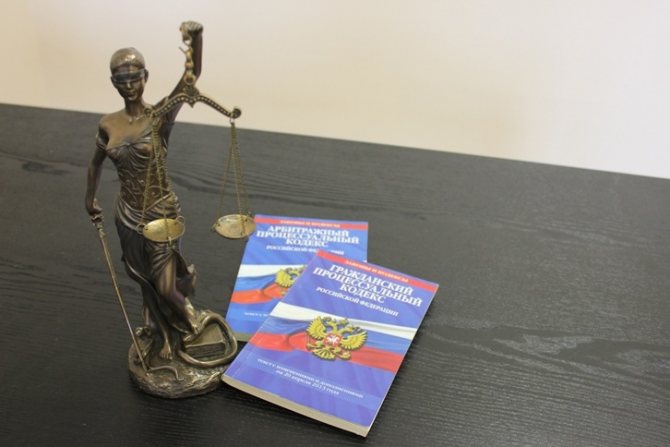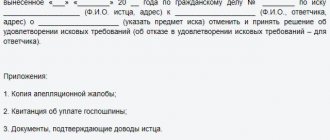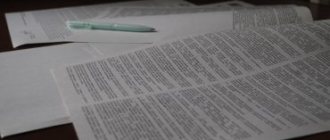In this article you can read about the procedure for canceling a court decision in absentia when appealing, as well as applications for canceling a court decision made in absentia.
The trial is most often conducted by the court in the presence of both parties - the defendant and the plaintiff. But practice shows that it happens that the defendant or plaintiff does not come to the meeting, as a result of which the proceedings may be postponed. But in cases specified by law, if the defendant fails to appear at the court hearing, the institution of absentee proceedings is provided for, that is, the case is considered in the absence of the defendant. An absentee decision on a claim may be made in the absence of the defendant for an unexcused reason and with the consent of the plaintiff to such consideration of the case.
Between the lines: the failure of the plaintiff to appear at the court hearing does not lead to such procedural consequences.
Why is a default judgment dangerous?
It would seem, what negative consequences can a court decision in absentia have? Let's try to figure it out. It is one thing if the defendant was unable to attend the trial and agrees with the verdict. It’s another matter when a situation arises when bailiffs come to the defendant and threaten to take away personal property. Moreover, the reason for the “unpleasant” visit was a court decision made in absentia at a meeting that took place, of which the defendant was not aware. He did not receive any summons or telegrams. Was not notified of the court's default judgment and did not receive a copy of this decision.
Very often banks abuse this by taking the debtor to court and trying to collect the loan debt from him without the client’s knowledge. What to do in such a situation? Is it possible to challenge or cancel a default judgment? The most effective and competent step in this difficult situation is a timely contact with a qualified lawyer who will quickly and with a guarantee close to 100% resolve even the most complex issue to the benefit of the client. If this is not possible, you need to follow the procedure given in this article.

Related documents
- Sample. Application for review based on newly discovered circumstances of the decision of the appellate instance of the arbitration court (example)
- Sample. Application for review of a decision in a civil case due to newly discovered circumstances
- Sample. Application for reconsideration of a criminal case based on newly discovered circumstances
- Sample. Application for a meeting with a convicted person
- Sample. Application for inviting a lawyer to participate in the case
- Sample. Application for recognition of a citizen as missing
- Sample. Application for recognition of a citizen as legally competent
- Sample. Application for declaring a citizen incompetent
- Sample. Application for recognition of a citizen as having limited legal capacity
- Sample. Application to file a protest against a court decision in absentia declaring the purchase and sale agreement invalid
- Sample. Application for divorce
- Sample. Application for divorce
- Sample. Application for divorce (option 2)
- Sample. Application for consent to divorce
- Sample. Application to change the subject of the claim
- Sample. Application for securing evidence
- Sample. Application to declare a citizen dead
- Sample. Application to challenge a judge (in accordance with Article 16 of the Code of Civil Procedure of the Russian Federation)
- Sample. Application for refusal to issue a court order to the creditor to collect debt from the guarantor under the loan agreement
- Sample. Application for postponing the trial and postponing the consideration of the case to a later date
How to cancel a default judgment: grounds for cancellation
Knowing the grounds for proceedings in absentia will help you understand how to properly challenge and cancel a decision in absentia.
Conducting a court hearing and consideration in absentia is permitted only if the following grounds exist:
- If the defendant has expressed written consent to consider the claim in his absence;
- If the defendant is familiar with the time and date of the court hearing, received notice and is considered aware, nevertheless, he did not appear at the trial and did not notify the reasons for his absence.
At the same time, for an absentee hearing to take place, the consent of not only the defendant, but also the applicant is required. If the plaintiff expresses disagreement with the court hearing without the participation of the other party, the hearing is automatically postponed, and the defendant is sent a second notice with a requirement to appear in court.
Application to cancel a default judgment. Sample. Civil lawyer.
Legal advice from a lawyer in civil cases . According to Article 237 of the Civil Procedure Code of the Russian Federation, the defendant has the right to file with the court that made the decision in absentia an application to cancel this court decision within seven days from the date of delivery of a copy of this decision to him.
A court decision in absentia may also be appealed by the parties on appeal within a month after the expiration of the deadline for the defendant to file an application to cancel this court decision, and if such an application is filed, within a month from the date of the court’s decision to refuse this application. .
District Court of Moscow to Federal Judge
from a lawyer
against the district court's default judgment
APPLICATION for cancellation of default judgment
The claim for debt collection was satisfied by an absentee decision of the Moscow district court.
The court ruled: to collect from the defendant in favor of the plaintiff the debt in the amount of 442,288 US dollars 58 cents in rubles at the exchange rate of the Central Bank of the Russian Federation on the date of execution of the court decision.
The court decision was received on June 1, 2011. I believe that the court’s default judgment is subject to cancellation on the following grounds:
In accordance with paragraph 1 of Article 233 of the Civil Procedure Code of the Russian Federation, one of the grounds for considering a case in absentia proceedings is the failure of the defendant, notified of the time and place of the court hearing, to appear at the court hearing.
In accordance with the procedure established by Articles 113 and 116 of the Civil Procedure Code of the Russian Federation, persons participating in the case are notified or summoned to court by registered mail or subpoena with return receipt requested, telephone message or telegram, or using other means of communication and delivery that ensure recording a judicial notice or summons and delivering it to the addressee. Moreover, a court summons addressed to a person participating in the case is served personally against a signature on the counterfoil of the summons, which must be returned to the court.
The reasons for the decision in absentia indicate such circumstances as the defendant’s failure to appear in court and proper notification of the defendant by the court.
However, in violation of paragraph 4 of Article 198 of the Civil Procedure Code of the Russian Federation, the decision does not include evidence on which the court’s conclusions about these circumstances are based.
I was not properly notified of the time and place of the court hearing and no one informed me about it.
Neither I personally nor my lawyer received a subpoena or any other legal means of notice of the consideration of the case in court or signed on any documents.
In violation of clause 1. Article 55 and paragraph 1. Article 56 of the Code of Civil Procedure of the Russian Federation, having considered the case without my participation, the court actually infringed on my procedural rights as a defendant, provided for in Art. 35 Code of Civil Procedure of the Russian Federation; deprived me of the opportunity not only to present my objections and evidence on the merits of the claims filed against me, but also to present the circumstances, as well as evidence that has legal significance for the correct resolution of the case.
Having considered the case without my participation, the court actually gave a one-sided assessment of the evidence, without receiving explanations from other participants in the process, thereby grossly violating the requirements of Art. 67 of the Code of Civil Procedure of the Russian Federation, without thoroughly examining the circumstances that are completely, objectively and directly significant for the correct resolution of the case.
The court, in violation of paragraph 1. Article 56 of the Code of Civil Procedure of the Russian Federation, recognized the plaintiff’s explanations as evidence of the presence of information about facts reliably indicating that I signed the loan agreement with my own hand (see the court’s decision in absentia).
Meanwhile, I did not put my signature on the loan agreement.
This circumstance may affect the court's decision. According to Article 242 of the Civil Procedure Code of the Russian Federation, a court decision in absentia is subject to cancellation if the court establishes that the defendant’s failure to appear at the court hearing was caused by valid reasons, which he was not able to inform the court in a timely manner, and in this case the defendant refers to the circumstances and presents evidence that may influence the content of the court decision.
Lawyer that the circumstances stated in the application and the evidence presented to the court can significantly affect the content of the court's decision.
Guided by Articles 237 - 243 of the Civil Procedure Code of the Russian Federation,
ASK:
The absentee decision of the Moscow district court on the claim for debt collection is cancelled.
professional civil lawyer in Moscow
Additionally:
Sample appeal in a civil case.
Sample of a cassation appeal in a civil case.
Procedure for canceling a default judgment
As already stipulated, the defendant may take the initiative to cancel the default judgment within 7 days from the date of receipt of a copy of the judicial act. To do this, you need to send a written application to the court that made the decision. The application is reviewed within 10 days. The process of considering an application includes assessing the applicant’s claims and considering the entire case from the beginning, with the involvement of evidence and evidence, including those previously not taken into account by the court and mandatory notification of all persons involved in the case.
Can an appeal be refused?
Upon receipt of a complaint, the court may reject it for 3 reasons:
- the reasons for filing an appeal do not constitute a compelling argument for the court;
- the higher court recognizes the decision in absentia as justified and legal and leaves it unchanged;
- The document is not prepared according to the rules and has errors.
As for the reasons, this is decided separately for each case, in the appropriate order; most often this happens with civil cases.
If the appeal was refused on the basis of the legality of the decision by a higher court, then a cassation appeal should be filed (read more about how to file a cassation appeal in a civil case), the second appeal will not have any effect. And if errors were made during the preparation of the appeal, the court sets a period (usually 30 days) during which the errors must be corrected. If the deadlines are violated, the complaint will be rejected by the court.
If the petition to cancel the default judgment did not help, then filing an appeal is not only possible, but also necessary. Competently compose the text of the complaint, meet the deadlines specified by law, and carefully select evidence of your case. Thus, an appeal will allow you to get a fair decision in any court case.
How to make a statement when canceling a decision made in absentia?
An application to cancel a default judgment must contain:
- the name of the court that issued the default judgment;
- case number;
- data of the parties
- list of attached documents.
The application should indicate:
- valid reasons for failure to appear at the “court”, as well as the inability to timely notify the court of the reasons for absence.
- circumstances that were not taken into account by the court or, in the opinion of the defendant, were misinterpreted, as well as provide evidence that could influence the court’s position and lead to the reversal of the previous decision in the case.
The court has the right to satisfy the application, cancel the default judgment and send the case for retrial according to the general rules.
If the court refuses to satisfy the application, it remains possible to subsequently appeal its reasoned determination.
How to properly file a complaint?
When filing an appeal against a court decision in absentia, it is extremely important to provide the following information:
- The name of the authority to which the complaint will be filed. Remember, it must be a higher court (appeal) and not the same one (appeal).
- Full name of the plaintiff who draws up and files the complaint.
- Full description of the contested default judgment.
- The name of the court that issued this default judgment, which the plaintiff considers unfair or incorrect from the point of view of the law, his personal rights, etc.
- An indication that the decision was made incorrectly. The exact wording of why this default judgment is wrong, why the court case needs to be re-examined with a different result.
- A reliable explanation of the illegality and groundlessness of the default judgment. It is necessary to indicate:
— laws that were violated/not taken into account during legal proceedings;— all necessary regulatory legal acts;
- case materials that need attention but were ignored, etc.
- Indicate whether the default judgment will be appealed in whole or in part.
- Explain what changes need to be made (in the applicant's opinion).
- A list of documents attached to the complaint, the reliability of the information specified in the text (including copies for each person participating in the judicial proceedings).
- Date of filing the complaint, signature of the person who was involved in drawing up the complaint (that is, on whose behalf the document is being submitted).
This document can be submitted no later than 30 days from the expiration of the deadline for the defendant to file an application to cancel the default judgment. If such a document was provided, then the period for appeal begins to apply from the day when the decision was notified of the review.

form of appeal against a decision of a district (city) court in .doc (Word) format. The appeal itself is submitted to the office of the appellate court. This is a judicial body that reviews cases, decisions, sentences, etc.
If it is necessary to indicate additional information that was rejected by the court of first instance or was not submitted to the court in a timely manner, a petition should be drawn up. In its text, it is important to note that it is a document containing additional information. If the petition was not indicated in the text of the appeal, it can be drawn up as a separate document and submitted as an attachment to the complaint. Confirmation of payment of the state fee is required.
Apart from the specified papers, there is no need to attach anything to the appeal, since all other documents are already included in the court case.
During the consideration of the case, the court may require additional documents or expert assessments. This also needs to be taken into account when filing an appeal.
If desired, and to eliminate any errors, when drawing up a document, you can seek the help of a lawyer or advocate who will help in filing a complaint. A specialist will also help you draft a document correctly if you can’t do it yourself.
Appeal
If the application to overturn the decision is refused, the defendant has the opportunity to appeal. He will also have this right in the event that the deadline for filing an application to cancel the default judgment has been missed.
The plaintiff also has the right to appeal a court decision in absentia that has not entered into legal force. But in practice, this is done, firstly, when a decision in absentia is not in favor of the plaintiff, and secondly, when the period allotted to the defendant to cancel the decision has passed, and he has not taken advantage of this right.
The appeal procedure is general:
- The appellate instance for the magistrate is the district court, for the district court - the court of the subject of the federation.
- The complaint is filed through the court, whose decision is being appealed.
- The period for preparing and filing a complaint is one month. If the defendant has not filed an application to cancel the default judgment, it is counted as 7 days + a month from the date of delivery of a copy of the default judgment to the defendant. If the application has been filed, the month period must be counted from the date of the decision to refuse the defendant’s application.
The appellate authority checks the legality and validity of the default decision. In this case, it has the right to limit itself only to the arguments of the applicant (defendant or plaintiff) or to check the decision in full.
Applicant's tasks:
- Prepare a complaint in full compliance with procedural requirements (Article 322 of the Code of Civil Procedure of the Russian Federation).
- It is not enough for the applicant to bring new and (or) additional evidence that will allow the appellate court to look at the case differently, but for the applicant to convince the court that he is right.
- Reasonably justify, with evidence, why the absentee decision is illegal or unreasonable. In this case, references to laws and factual evidence are provided.
- Collect and attach to the complaint documents that confirm the arguments and demands.
The parties participate in the consideration of the case by way of appeal. In fact, this is a second full-fledged process, where both already known circumstances and new ones can be reconsidered. New requirements are prohibited, but all old ones, if necessary, are revised in full. Therefore, when you appeal, it is extremely important to ensure that you and/or your lawyer(s) appear.
Depending on the applicant’s requirements or at its discretion, the appellate court has the right to:
- leave the default judgment in force without changing anything;
- cancel/change the decision completely/partially by making a new one;
- cancel the decision in whole/partially, terminating the proceedings or leaving the claim without consideration in whole/partially;
- leave the complaint without consideration if the appeal is overdue and the deadline has not been restored.
Features of an absentee decision and the scheme for appealing it
A court decision in absentia is possible only when considering a case in a court of first instance. In Russia, the practice of making decisions in absentia has become almost widespread due to the reluctance of the parties to personally come to court hearings or to ensure the participation of a representative in the process.
The possibility of considering the case in absentia and making a decision is determined by the court. If the defendant fails to appear when summoned and does not provide the reasons for his failure to appear, the judge may postpone the hearing for some time, but as a result, most likely, he will make a decision in absentia. A decision in absentia is also made if the defendant himself requests consideration of the case without his participation in the process.
The general scheme for appealing a court decision in absentia is as follows:
- Submission by the defendant of an application to cancel the decision within 7 days from the date of delivery of its copy.
- Appeal within a month after the expiration of the 7-day period for the defendant to file an application to cancel the decision or, if the application is filed, from the date of the decision to refuse it.
- Cassation appeal within 6 months from the date the decision entered into force, provided that there was an appeal. The absence of an appeal, accordingly, will not allow you to appeal a court decision in absentia to a supervisory authority, since an appeal there requires a preliminary passage of cassation.









